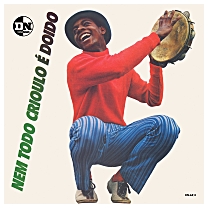 Martinho da Vila/Various Artists "Nem Todo Crioulo E Doido" (DiscNews/Codil, 1968) (LP)
Martinho da Vila/Various Artists "Nem Todo Crioulo E Doido" (DiscNews/Codil, 1968) (LP)
(Produced by Expedito Alves, Norival Reis & Nilton Valle)
Martinho da Vila sings on four of the tracks of this delightful album which showcases several samba-school singers such as puxador Zuzuca and a gal named Analia, as well as several samba percussionists of the late '60s. Martinho's voice is smooth as silk, but there's lots of other talent thrown in the spotlight as well: in the credits, the songs are identified with various escolas (Mangueira, Portela, Salgueiro, Imperio Serrano, Imperio Tijuca and of course Martinho's own school, Vila Isabel, as well as a couple of other smaller groups) while the backing band is equally far-flung, comprised of bassist Darcy da Mangueira, cavaquinho player J. Araujo and percussion by the Conjunto Brasil Ritmo 67, which was probably just a convenient name for whichever musicians they booked for the sessions. Although most tracks have vocals, there's also a great batucada drumming instrumental ("Ritmo") that starts off Side Two, featuring a magnificent cuica player named Nenen. The arrangements are fairly modest and straightforward, and much like Da Vila's albums that followed, don't yet have the lavish, expansive sound that pagode samba would have by the mid-'70s. All in all, a swell set, richly authentic, even with the fairly conservative production style.
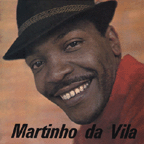 Martinho Da Vila "Martinho Da Vila" (BMG-Brasil, 1969) (LP)
Martinho Da Vila "Martinho Da Vila" (BMG-Brasil, 1969) (LP)
(Produced by Romeu Nunes)
A beautiful early album, featuring Da Vila at the top of his form as a Carnaval songwriter. Every song on here is an original Da Vila composition, with many that were themes for the annual Carnaval celebrations. The performances are all taken at a slow, unhurried pace, which greatly enhances their power, and the production is pretty bare bones. Features the original version of "Brasil Mulato," one of his most memorable melodies. Stripped down, mighty sweet, and definitely recommended.
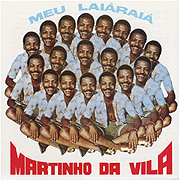 Martinho Da Vila "Meu Laiaraia" (BMG-Brasil, 1970) (LP)
Martinho Da Vila "Meu Laiaraia" (BMG-Brasil, 1970) (LP)
(Produced by Romeu Nunes)
An absolutely stunning album, with a gentle acoustic base and deft, subtle use of strings and back-up chorus, and tons of overlapping melody and rhythm. Once again, all the songs are written by Da Vila, which gives you an inkling of his prolific talent... In some ways this is rooted in the older studio sounds of the late bossa nova era, but the production touches are harnessed to the samba with great delicacy and skill -- this reminds me of one of my favorite Jair Rodrigues albums, 1973's Orgulho de um Sambista, which also has a feeling of great ethereal beauty. Highly recommended!
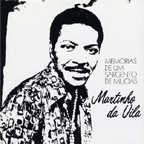 Martinho Da Vila "Memorias De Um Sargento Do Milicias" (BMG-Brasil, 1971) (LP)
Martinho Da Vila "Memorias De Um Sargento Do Milicias" (BMG-Brasil, 1971) (LP)
(Produced by Rildo Hora & Joao Costa Netto)
Joyful, smooth, wonderful sambas... about what you'd expect, though not much more. This time only about half the songs are Da Vila originals; the rest of the record includes classics by Atualfo Alves, Xango and Candeia, and the title track, written by his fellow samba traditionalist, Paulinho Da Viola. Guitarist Rosinha De Valenca plays on several songs; Da Vila also starts his long association with Rildo Hora, who plays on one song and co-produces the album. If you're looking for a great early Martinho da Vila album, this would do fine. But if you're looking for the best Martinho da Vila albums, you could poke around a little more.
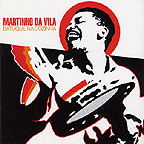 Martinho Da Vila "Batuque Na Cozinha" (BMG-Brasil, 1972) (LP)
Martinho Da Vila "Batuque Na Cozinha" (BMG-Brasil, 1972) (LP)
(Produced by Rildo Hora & Severino Filho)
A good album, but ultimately underwhelming in terms of the arrangements and pacing. Pleasant acoustic samba material with the cavaquinhos, chorus and Da Vila's flawlessly suave vocals, but it does seem a bit by-the-book. All but one of the songs are Da Vila compositions; the title track is by Joao Da Baiana... One standout number is a zippy little forro song that rounds off the end of the album. This might not be Da Vila's best album, but it's still pretty groovy.
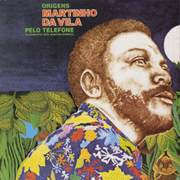 Martinho Da Vila "Origens (Pelo Telefone)" (RCA-Brasil, 1973) (LP)
Martinho Da Vila "Origens (Pelo Telefone)" (RCA-Brasil, 1973) (LP)
(Produced by Rildo Hora & Severino Filho)
In part, this is Da Vila's tribute to the founders of samba cancao, including artists such as the legendary Donga, whose "Pelo Telefone" was the first samba ever recorded (way back in 1916). Da Vila's version is appropriately great, as are his new originals and a medley of songs written by Monsueto which kicks off the album. Also featured are sweet sambas by Monarco and Joao Nogueira, and several new ones by Da Vila himself... Another gorgeous album -- classic '70s samba.
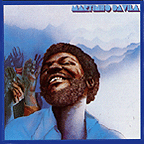 Martinho Da Vila "Canta, Canta Minha Gente" (RCA-Brasil, 1974) (LP)
Martinho Da Vila "Canta, Canta Minha Gente" (RCA-Brasil, 1974) (LP)
(Produced by Rildo Hora & Henrique Gastaldello)
Martinho Da Vila "Maravilhas De Cenario" (BMG-Brasil, 1975) (LP)
A drop-dead beautiful album with some unusual instruments and arrangements -- Spanish guitars, stop-and-start rhythms, etc. -- which make it a bit different from the standard samba fare. There are a couple of misfires (like the blaring trumpets on Joao Santiago's "Hino Dos Batutas de Sao Jose"), but overall, quite a yummy album. Recommended!
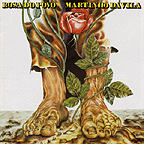 Martinho Da Vila "Rosa Do Povo" (BMG-Brasil, 1976) (LP)
Martinho Da Vila "Rosa Do Povo" (BMG-Brasil, 1976) (LP)
(Produced by Rildo Hora)
Yet another solid '70s album by this master sambista. Once again, hard to complain about anything on this one. Lovely stuff.
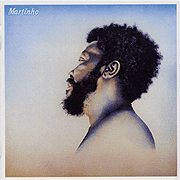 Martinho Da Vila "Presente" (BMG-Brasil, 1977) (LP)
Martinho Da Vila "Presente" (BMG-Brasil, 1977) (LP)
(Produced by Rildo Hora)
Delicious and richly layered as always, this album highlights Da Vila at his best, and also at his most diverse. Loungey pop, Cuban-style son, Afro-Brazilian percussion, soft ballads and drifting jazz all intermingle alongside Da Vila's usual lovely, luscious samba. One of his more distinctive albums of the era, encompassing a wide variety of styles, yet not treacly or tainted by the sort of sluggish clumsiness that many world-fusion albums often exhibit. This is a very skillful, very soulful set... very nice stuff!
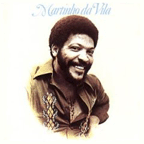 Martinho Da Vila "Tendinha" (BMG-Brasil, 1978) (LP)
Martinho Da Vila "Tendinha" (BMG-Brasil, 1978) (LP)
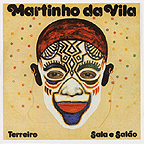 Martinho Da Vila "Terreiro, Sala E Salao" (BMG-Brasil, 1979) (LP)
Martinho Da Vila "Terreiro, Sala E Salao" (BMG-Brasil, 1979) (LP)
(Produced by Rildo Hora)
Another stunningly precise, pleasantly warm album, thought this time tilted towards the rawer, more percussive end of the street samba sound. As ever, Da Vila's delivery is calm and relaxed, and the call-and-response interplay between him and the chorus brings that style to an artistic high point, again showing his mastery of the form. Side Two unfortunately features an interminable twelve-tune Carvaval medley, which, as these things go, isn't so bad. But it pales in comparison to the gorgeous Da Vila originals which make up the rest of the album.
Martinho Da Vila "Portunhol" (BMG-Brasil, 1980) (LP)
Martinho Da Vila "Samba Enredo" (BMG-Brasil, 1981) (LP)
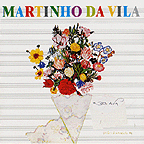 Martinho Da Vila "Sentimentos" (BMG-Brasil, 1981) (LP)
Martinho Da Vila "Sentimentos" (BMG-Brasil, 1981) (LP)
(Produced by Rildo Hora)
Despite the mellow-sounding title, this disc is actually a bit on the edgy side; there's a driving, aggressive feel that I can't quite place my fingers on, but for some reason I found this disc a little grating, and that I was put on edge by it. Not exactly what you expect in a Martinho Da Vila album. To be fair, though, there are songs on it that are classic Martinho-style samba, it's just that the album as a whole is a bit irritating.... It's okay, but not great.
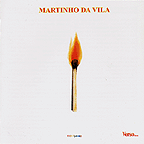 Martinho Da Vila "Verso E Reverso" (BMG-Brasil, 1982) (LP)
Martinho Da Vila "Verso E Reverso" (BMG-Brasil, 1982) (LP)
(Produced by Rildo Hora)
Although the intrusions of modern instruments are minor -- mainly the electric bass -- they do indicate a slight tilt towards the style of the times, as does a teensy hint of disco-y production on a couple of tracks. Really, there's nothing unpleasant on this album, but it doesn't have the sublime feel of his best stuff. Worth checking out, though, of course!
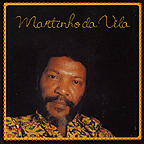 Martinho Da Vila "Novas Palavras" (BMG-Brasil, 1983) (LP)
Martinho Da Vila "Novas Palavras" (BMG-Brasil, 1983) (LP)
(Produced by Rildo Hora)
Another great record, this time with a wide variety of styles, wandering into non-samba pop, yet still sounding quite soulful and delicious. This album was recorded after a trip to Angola, and like many of his Brazilian MPB compatriots who had gone to Africa, Da Vila found himself swept up in the powerful emotions of a return to Mother Africa. On "Negros Odores," he addresses the Afro-Brazilian connection, name checking numerous African countries while putting forth an afrocentric spiritual-political viewpoint (amid a rather lovely melody, I might add). The album adds on a sad note, with the song "Clara Nunes," a tribute to the pagode samba queen who had died earlier the same year.
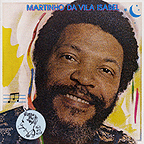 Martinho Da Vila "Isabel" (BMG-Brasil, 1984)
Martinho Da Vila "Isabel" (BMG-Brasil, 1984)
(Produced by Rildo Hora)
A beautiful record, from start to finish. Straightforward, gorgeous acoustic samba melodies, with standard-issue (yet rapturous) cavaquinho-and-chorus arrangements. Highly recommended.
Martinho Da Vila "Criacoes E Recriacoes" (BMG-Brasil, 1985)
(Produced by Rildo Hora)
Another nice, solid album, with a few mildly distracting, slick pop production flourishes -- a Stevie Wonder-ish harmonica, some light electronic swells. But on the whole, this is the same wonderful formula of catchy cavaquinho riffs, warm choruses, and lulling melodies which makes for some very pleasant listening. Da Vila is playing the role of romantic crooner, rather than samba savior, but if you give it this record a chance, it'll grow on you. Worth checking out.
Martinho Da Vila "Batuqueiro" (BMG-Brasil, 1986)
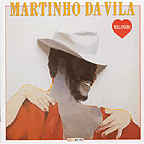 Martinho Da Vila "Corocao Malandro" (BMG-Brasil, 1987)
Martinho Da Vila "Corocao Malandro" (BMG-Brasil, 1987)
(Produced by Rildo Hora)
Another beautiful album, with a soft, mellow edge, but still enough passion and drive to rank it among one of his best. This is mostly a straight-ahead old-school pagode album, though a tune or two towards the end of the album have more of a jazzy, pop-vocals feel. This one's a winner, though... Recommended!
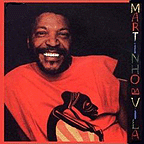 Martinho Da Vila "Festa Da Raca" (Sony-Brasil, 1988)
Martinho Da Vila "Festa Da Raca" (Sony-Brasil, 1988)
What can I say? Yet another nice pop-samba album, so deftly delivered that even the iffy production touches that would make make me cringe anywhere else, simply glide by as part of the landscape on this disc, telephone poles on the way to the beach. This isn't the most magical album ever, but it's pretty darn good.
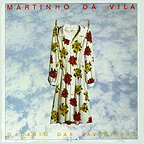 Martinho Da Vila "O Canto Das Lavadeiras" (Sony-Brasil, 1989)
Martinho Da Vila "O Canto Das Lavadeiras" (Sony-Brasil, 1989)
(Produced by Rildo Hora)
Dedicated to working-class laundresses, this set of socially-conscious samba-pop songs has a few modern production touches that may be off-putting to acoustic purists -- electric keyboards, bass, etc. -- but really, they aren't that intrusive, and the album is quite pleasant. Perhaps not his greatest work, but still nothing to sneeze at. More nice, typically warm, pleasant Da Vila fare.
Martinho Da Vila "Martinho Da Vida" (Columbia Records, 1991) (LP)
A good record, with only a slight gloss of iffy pop production. Fans of Cesaria Evora would probably enjoy this album: it's got that same swank, elegant feel.
Martinho Da Vila "Vai Meu Samba Vai" (Sony-Brasil, 1991) (LP)
Martinho Da Vila "No Tempo Da Criacao" (Sony-Brasil, 1992)
Martinho Da Vila "Ao Rio De Janiero" (Columbia, 1994)
Nice soothing vocals, but regrettably sappy production. Not glaringly yucky, but intrusive enough to interfere with my enjoyment of the album.
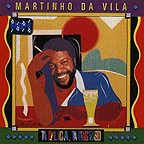 Martinho Da Vila "Ta Delicia, Ta Gostoso" (Sony-Brasil, 1996)
Martinho Da Vila "Ta Delicia, Ta Gostoso" (Sony-Brasil, 1996)
(Produced by Rildo Hora & Miguel Plopschi)
Like so many of Da Vila's albums, this is a mix of sublime melodies and sometimes-iffy production. Mostly, though, it's delightful. Lush, ripe, ornate acoustic sambas with occasional flourishes of gooey pop production. Certainly worth checking out.
Martinho Da Vila "Cafe Com Leite" (Mercury Records, 1996)
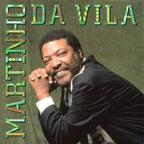 Martinho Da Vila "Coisas De Deus" (Sony-Brasil, 1997)
Martinho Da Vila "Coisas De Deus" (Sony-Brasil, 1997)
This starts off beautifully, with straight-ahead acoustic sambas, just like the old days, with a couple of slower ballads that misfire a bit. Abruptly, the second half of the album gets icky, with tinkling keyboards and other soft-soul instrumentation that really ruins the fun. Still, it's amazing the guy can still sound so great... at least when he feels like it.
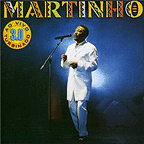 Martinho Da Vila "3.0 Turbinado" (Sony, 1998)
Martinho Da Vila "3.0 Turbinado" (Sony, 1998)
(Produced by Rildo Hora & Miguel Plopschi)
About what you'd expect from a concert album this late in his career. Stylistically wide-ranging, this live recording has satisfying moments and shows Da Vila's connection with his audience, particularly when he engages them in call-and-response singing... But he also loses some of the suave slinkiness that makes his studio albums so sweet. It's cool to get a sense of him as a concert performer, but many listeners may prefer his studio work instead.
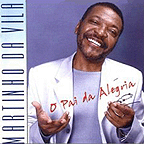 Martinho Da Vila "O Pai Da Alegria" (Columbia, 1999)
Martinho Da Vila "O Pai Da Alegria" (Columbia, 1999)
Another live recording.
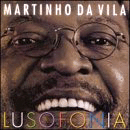 Martinho Da Vila "Lusofonia" (Columbia Records, 2000)
Martinho Da Vila "Lusofonia" (Columbia Records, 2000)
As the millennium unfolds, Da Vila explores the positive side of European colonial expansion with a pleasant, not-too-glitzy outing that celebrates the Portuguese-speaking Lusophone dance music of Cape Verde, Mozambique, Brazil and provinces far and wide... This has a hefty dose of West African highlife and Caribbean soca mixed in with Da Vila's standard samba sound, as well as lotsa guest musicians that I've never heard of (one assumes they are from Portugal, Guinea-Bissau and the other countries involved here). Cool concept, and one of Da Vila's nicest recent records. If you don't listen too closely, the glossier touches of pop production probably won't get in the way too much.
Martinho Da Vila "Da Roca E Da Cidade" (Sony, 2001)
Martinho Da Vila "Conexoes" (Sony, 2004)
Martinho Da Vila "Conexoes - Ao Vivo" (Sony, 2004)
Martinho Da Vila "Brasilatinidade" (EMI, 2005)
Martinho Da Vila "Martinho E Amigos" (BMG, 2006)
A collection of duets and collaborations with other Brazilian artists, including Beth Carvalho, Almir Guineto, Os Originais de Samba, Joao Nogueira and others...
Martinho Da Vila "Do Brasil E Do Mundo" (MZA, 2007)
Martinho Da Vila "O Pequeno Burgues" (MZA, 2009)
Martinho Da Vila "Da Roca E Da Cidade" (MZA, 2010)
Martinho Da Vila "Poeta Da Cidade: Martinho Canta Noel" (Biscoito Fino, 2010)
Martinho Da Vila "Lambendo A Cria" (2011)
Martinho Da Vila "Enredo" (Biscoito Fino, 2014)
Martinho Da Vila "De Bem Com A Vida" (Sony Music, 2016)
Martinho Da Vila "Alo Vila Isabeeeel!!!" (Sony Music, 2018)
Martinho Da Vila "Bandeira Da Fe" (Sony Music, 2018)
This set includes several younger guest artists, starting with family members such as Luiz Carlos da Vila, Tunico Da Vila and daughter Mart'Nalia, as well as Leonardo Bruno, Ze Catimba, Juju Ferreirah, Gloria Maria and Rappin Hood.
Discography - Best-Ofs
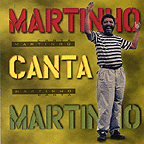 Martinho Da Vila "Martinho Canta Martinho" (RCA, 1997)
Martinho Da Vila "Martinho Canta Martinho" (RCA, 1997)
Beautiful acoustic sambas, with very tasteful production. I'm not sure, but I think this is a retrospective, with Da Vila performing his own compositions. And as such, it is very highly recommended!
Martinho Da Vila "20 Anos De Samba" (BMG, 1997)
Wow! A lavish 3-CD set of his best material from his RCA/BMG years... it's gotta rock!
Martinho Da Vila "Meu Samba Feliz" (Tropical Music, 1998)
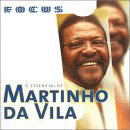 Martinho Da Vila "Focus: O Essestial De Martinho Da Vila" (BMG, 1999)
Martinho Da Vila "Focus: O Essestial De Martinho Da Vila" (BMG, 1999)
Martinho Da Vila "Batuca No Chao" (Musica Latina, 1999)
Martinho Da Vila "Series XXI" (Sony, 2000)
Martinho Da Vila "21 Grandes Sucessos" (Sony, 2000)
Beautiful acoustic sambas, with very tasteful production. I'm not sure, but I think this is a retrospective, with Da Vila performing his own compositions. And as such, it is very highly recommended!
Martinho Da Vila "Canta Canta Minha Gente" (BMG, 2001)
Although this has the same title as one of his mid-'70s LPs, it's actually a fine best-of, drawing on his RCA/BMG years. Tasty stuff!
Martinho Da Vila "Serie Bis: Ao Vivo" (2007)
Other Media
Martinho Da Vila "Cariocas Les Musiciens De La Ville" (Screen Vision, 1987) (DVD)
Da Vila is the focus of this French-produced documentary film, which paints a portrait of his work in the late 1980s. (In Portuguese, with French, Spanish and English subtitles.)
Martinho Da Vila "Brasilatinidade - Ao Vivo" (2005) (DVD)
A live concert video.
Martinho Da Vila "Lambendo A Cria" (2012) (DVD)
A live concert video.
Links


Main Brazil Index

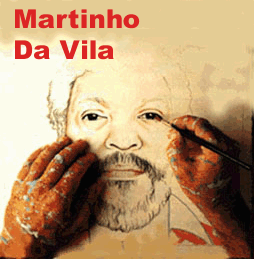 A suave, sensual male singer who got his start writing songs for the Carnaval parades in the 1960s, Martinho Da Vila is one of Brazil's premiere songwriters and greatest samba stars. His warmly-orchestrated, upbeat records generally deliver the goods. A few later albums from the late '80s and 1990s may include questionable instrumentation, but overall he's still a class act. Here's a quick look at DaVila's catalog... to tell the truth, they're all so good that I find it hard to say much about these albums individually... They all sound great to me!
A suave, sensual male singer who got his start writing songs for the Carnaval parades in the 1960s, Martinho Da Vila is one of Brazil's premiere songwriters and greatest samba stars. His warmly-orchestrated, upbeat records generally deliver the goods. A few later albums from the late '80s and 1990s may include questionable instrumentation, but overall he's still a class act. Here's a quick look at DaVila's catalog... to tell the truth, they're all so good that I find it hard to say much about these albums individually... They all sound great to me!

 Martinho da Vila/Various Artists "Nem Todo Crioulo E Doido" (DiscNews/Codil, 1968) (LP)
Martinho da Vila/Various Artists "Nem Todo Crioulo E Doido" (DiscNews/Codil, 1968) (LP)
 Martinho Da Vila "Martinho Da Vila" (BMG-Brasil, 1969) (LP)
Martinho Da Vila "Martinho Da Vila" (BMG-Brasil, 1969) (LP)
 Martinho Da Vila "Meu Laiaraia" (BMG-Brasil, 1970) (LP)
Martinho Da Vila "Meu Laiaraia" (BMG-Brasil, 1970) (LP)
 Martinho Da Vila "Memorias De Um Sargento Do Milicias" (BMG-Brasil, 1971) (LP)
Martinho Da Vila "Memorias De Um Sargento Do Milicias" (BMG-Brasil, 1971) (LP)
 Martinho Da Vila "Batuque Na Cozinha" (BMG-Brasil, 1972) (LP)
Martinho Da Vila "Batuque Na Cozinha" (BMG-Brasil, 1972) (LP)
 Martinho Da Vila "Origens (Pelo Telefone)" (RCA-Brasil, 1973) (LP)
Martinho Da Vila "Origens (Pelo Telefone)" (RCA-Brasil, 1973) (LP)
 Martinho Da Vila "Canta, Canta Minha Gente" (RCA-Brasil, 1974) (LP)
Martinho Da Vila "Canta, Canta Minha Gente" (RCA-Brasil, 1974) (LP)
 Martinho Da Vila "Rosa Do Povo" (BMG-Brasil, 1976) (LP)
Martinho Da Vila "Rosa Do Povo" (BMG-Brasil, 1976) (LP)
 Martinho Da Vila "Presente" (BMG-Brasil, 1977) (LP)
Martinho Da Vila "Presente" (BMG-Brasil, 1977) (LP)
 Martinho Da Vila "Tendinha" (BMG-Brasil, 1978) (LP)
Martinho Da Vila "Tendinha" (BMG-Brasil, 1978) (LP)
 Martinho Da Vila "Terreiro, Sala E Salao" (BMG-Brasil, 1979) (LP)
Martinho Da Vila "Terreiro, Sala E Salao" (BMG-Brasil, 1979) (LP)
 Martinho Da Vila "Sentimentos" (BMG-Brasil, 1981) (LP)
Martinho Da Vila "Sentimentos" (BMG-Brasil, 1981) (LP)
 Martinho Da Vila "Verso E Reverso" (BMG-Brasil, 1982) (LP)
Martinho Da Vila "Verso E Reverso" (BMG-Brasil, 1982) (LP)
 Martinho Da Vila "Novas Palavras" (BMG-Brasil, 1983) (LP)
Martinho Da Vila "Novas Palavras" (BMG-Brasil, 1983) (LP)
 Martinho Da Vila "Isabel" (BMG-Brasil, 1984)
Martinho Da Vila "Isabel" (BMG-Brasil, 1984)
 Martinho Da Vila "Corocao Malandro" (BMG-Brasil, 1987)
Martinho Da Vila "Corocao Malandro" (BMG-Brasil, 1987)
 Martinho Da Vila "Festa Da Raca" (Sony-Brasil, 1988)
Martinho Da Vila "Festa Da Raca" (Sony-Brasil, 1988)
 Martinho Da Vila "O Canto Das Lavadeiras" (Sony-Brasil, 1989)
Martinho Da Vila "O Canto Das Lavadeiras" (Sony-Brasil, 1989)
 Martinho Da Vila "Ta Delicia, Ta Gostoso" (Sony-Brasil, 1996)
Martinho Da Vila "Ta Delicia, Ta Gostoso" (Sony-Brasil, 1996)
 Martinho Da Vila "Coisas De Deus" (Sony-Brasil, 1997)
Martinho Da Vila "Coisas De Deus" (Sony-Brasil, 1997)
 Martinho Da Vila "3.0 Turbinado" (Sony, 1998)
Martinho Da Vila "3.0 Turbinado" (Sony, 1998)
 Martinho Da Vila "O Pai Da Alegria" (Columbia, 1999)
Martinho Da Vila "O Pai Da Alegria" (Columbia, 1999)
 Martinho Da Vila "Lusofonia" (Columbia Records, 2000)
Martinho Da Vila "Lusofonia" (Columbia Records, 2000)
 Martinho Da Vila "Martinho Canta Martinho" (RCA, 1997)
Martinho Da Vila "Martinho Canta Martinho" (RCA, 1997)
 Martinho Da Vila "Focus: O Essestial De Martinho Da Vila" (BMG, 1999)
Martinho Da Vila "Focus: O Essestial De Martinho Da Vila" (BMG, 1999)


